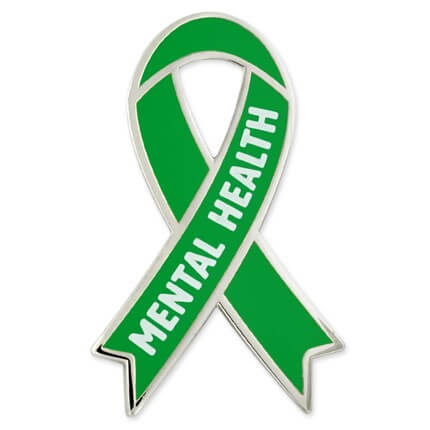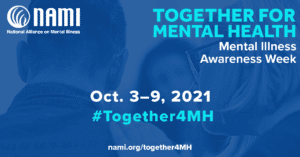- The Ultimate Guide to Journaling: How To Teach Expressive Writing - June 13, 2022
- Journaling: How To Use Writing To Support Your Mental Health - May 27, 2022
- How To Honor National Mental Illness Awareness Month With Action - October 3, 2021
Last Updated on October 23, 2024
In reflecting on some of the major crises that afflict our country, I made a quick list of those issues I most often hear discussed in news stories:
- Opioid epidemic
- Mass shootings
- Unhoused people
- Exploding prison populations
- Rise in the rate of suicide in adolescents and teens
- Rise in the rate of domestic violence and child abuse and neglect
It might not be immediately apparent to you, but a startling common denominator jumps out at me from this list. When you do a deep dive into what is at the core of many of our nation’s most troubling issues, one criterion will appear for each: mental illness.
I am keenly aware of this for two reasons; first, mental illness runs in my family. (This is a personal fact that just three or four years ago I would have been embarrassed to admit publicly.) Second, I am a volunteer for the National Alliance on Mental Illness (NAMI). Please indulge me while I tell you a little about NAMI.
National Alliance on Mental Illness

NAMI has a three-pronged approach to its mission: advocacy, education, and support. NAMI offers stronger family and caregiver support services than other organizations, but it shares the policy mission of several groups that work toward improving the lives of those with mental illness, such as Mental Health America, the American Psychiatric Association, Substance Abuse and Mental Health Services, the American Psychological Association, and the National Association of Psychiatric Health Systems.
Should You Care About Mental Illness?
Yes, you should. Most people get uncomfortable or tongue-tied when the topic of mental illness comes up. Many don’t even realize that depression and anxiety are considered mental illnesses. So, if mental illness does not affect you, a family member, co-worker, or friend, count yourself lucky. Statistically very lucky. According to the National Institute of Mental Health (NIMH), mental illnesses are common in the United States. In 2017, it was estimated that one in five US adults has a diagnosed mental illness—that’s 46.6 million people.
[Are you ready to help? Read Make a Difference with Mental Health Activism.]
No Casserole for You

A friend who has written extensively about families with mentally ill children told me that people refer to mental illness as the “Non-Casserole Disease.” I thought I knew what she meant but asked her to clarify.
So, if you find out that someone has broken a leg, or is going through chemotherapy, you bring over food to help out. But if you learn that someone’s teenage son is diagnosed with bi-polar disorder, or your friend’s husband has major depression, you stay away. No casseroles… – Dr. Judith J. Wurtman
Is Wurtman’s friend right? In my experience, she is.
Consider the Consequences
In a series of articles for Life At the Intersection, I will discuss the impact of mental illness in six areas:
- Stigma, the #1 reason the mentally ill do not seek treatment and suffer discrimination
- Childhood trauma and the hot topic of Adverse Childhood Experiences (ACEs)
- Incorporation of mental health education into health education in K-12
- Alcohol and substance abuse, with a focus on the opioid epidemic
- Prison overpopulation related to the use of jails and prisons to house the mentally ill
- Rise in suicide among teens and children
- Parity in mental health care, achieved through the ACA and now under attack
Within each area, I hope to inspire action, encourage progress, end stigma, and build an understanding of this community of more than 46 million men, women, and children.
READ NEXT
Read Trish Lockard’s Series on Mental Health Awareness
- Think the Pandemic Was Hard? Consider the Impact on Those With Mental Illness
- With Mental Illness You Won’t Get a Casserole
- Stigma: A Thorn in the Side of Mental Health Care
- 12 Creative Ways to Support Mental Health
- Suicide Prevention at the Heart of Activist’s Memorial Efforts
- The Olympics Opens the Door to Much-needed Athlete Mental Health Conversation




An interesting and informative piece, and I’d not heard the title phrase before. I’ve signed up to see more from you, as mental health is why I started my blog (though I’ve rambled all over the place since then!)
Clive, thank you. As the piece says, this is the first of several articles on activism in support of various mental health issues. I’d like to read your blog. Contact me. strikewritetone@gmail.com
Clive, will you post your blog link here?
Hi, Clive. Thank you for stopping by. I feel quite honored to have Trish guest blogging for me and I know she is going to dive into some interesting topics in future posts.
Pingback: Stigma: A Thorn in the Side of Mental Health Care • Life At the Intersection
Pingback: At the Intersection of Ego and Creativity
Pingback: Monday InLinkz Join us at 162 Senior Salon • Esme Salon
Pingback: Suicide Prevention at the Heart of Activist’s Memorial Efforts
Pingback: Get Started: Gabe Howard Encourages Action, Not Perfection
Pingback: The Olympics Open the Door to an Athlete Mental Health Conversation
Pingback: How to Honor Mental Illness Awareness Week with Action
Pingback: Journaling: How To Use Writing To Support Your Mental Health
Pingback: Make a Difference with Mental Health Activism
Pingback: Mental Health in the Workplace: How to Maximize Corporate Wellness